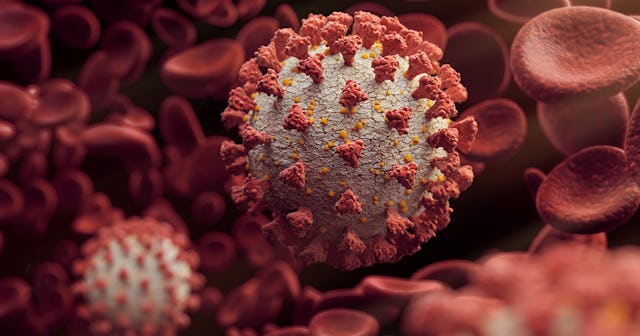The CDC Adds 6 New Possible COVID-19 Symptoms

The Centers for Disease Control and Prevention has added six new possible coronavirus symptoms to its official list
Since the term “novel coronavirus” first gained universal recognition in December 2019, our understanding of it has evolved. As more people have become infected with the highly infectious and deadly virus, and as more studies have been conducted and case studies reported, we’ve learned more about how it’s spread, what it does to the body, the fatality rate, and of course, its symptoms. And this weekend, the United States Centers for Disease Control and Prevention (CDC) updated added six new symptoms to their official list.
Chills, repeated shaking with chills, muscle pain, headache, sore throat, and new loss of taste or smell have been added to the list, which also includes previously known symptoms of fever, cough, and shortness of breath or difficulty breathing. The CDC reminds that symptoms can appear two to 14 days after exposure to COVID-19 and can range from “mild symptoms” to “severe illness.”
RELATED: 11 Things To Eat And Drink When You Have A Sore Throat (And 6 To Avoid)
Additionally, the CDC lists a non-inclusive set of emergency warning signs that signal a need to get immediate medical attention. These include trouble breathing, persistent pain or pressure in the chest, new confusion or inability to arouse, and bluish lips or face. “Call 911 if you have a medical emergency: Notify the operator that you have, or think you might have, COVID-19. If possible, put on a cloth face covering before medical help arrives,” they said.
The World Health Organization (WHO) also noted a major change in understanding surrounding COVID-19. Previously, many experts believed that people could only catch the coronavirus once, due to the fact that they became immune to it. However, in a scientific brief published on April 24, WHO explained that this concept of one-time infectious leading to immunity hasn’t actually been proven and shouldn’t be assumed as the world moves forward searching for solutions, vaccinations, cures, and, more specifically, “immunity passports.”
“Some governments have suggested that the detection of antibodies to the SARS-CoV-2, the virus that causes COVID-19, could serve as the basis for an ‘immunity passport’ or ‘risk-free certificate’ that would enable individuals to travel or to return to work assuming that they are protected against re-infection,” WHO wrote. “There is currently no evidence that people who have recovered from COVID-19 and have antibodies are protected from a second infection.”
WHO added: “People who assume that they are immune to a second infection because they have received a positive test result may ignore public health advice. The use of such certificates may therefore increase the risks of continued transmission.”
Later in the day, the WHO clarified their statement on social media, explaining that they “expect most people” who are infected with the virus to “develop an antibody response that will provide some level of protection.”
Information about COVID-19 is rapidly changing, and Scary Mommy is committed to providing the most recent data in our coverage. With news being updated so frequently, some of the information in this story may have changed after publication. For this reason, we are encouraging readers to use online resources from local public health departments, the Centers for Disease Control, and the World Health Organization to remain as informed as possible.
This article was originally published on